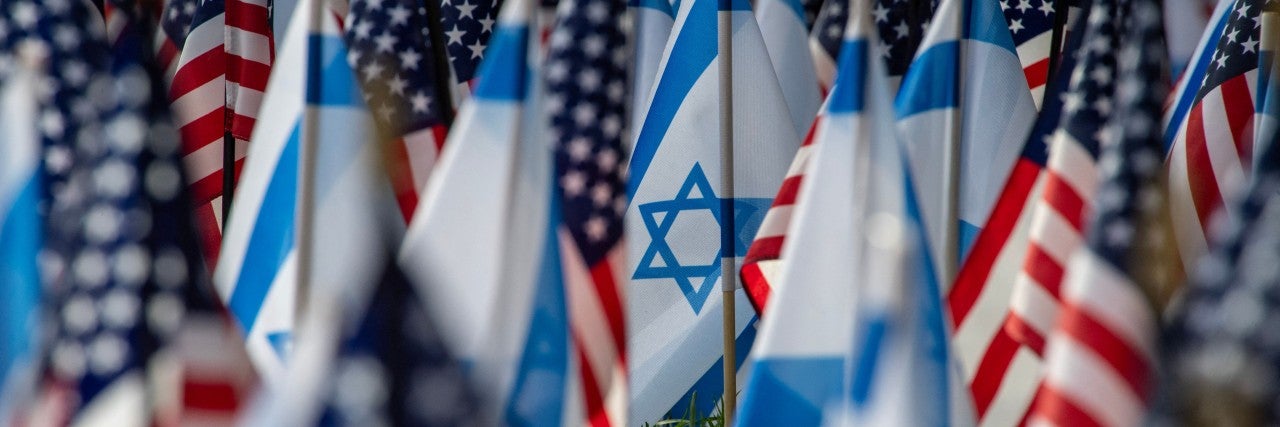March 5, 2025
U.S. security aid serves two main purposes: bolstering a key ally’s defense capabilities against terrorist threats and fortifying U.S. geopolitical interests in a volatile region. It’s particularly important in Israel, the only democracy in the Middle East, which is constantly under attack.
On October 7, Hamas terrorists staged a savage early morning attack, killing more than 1,200 people (mostly civilians), kidnapping 240 others, and firing thousands of rockets. In April, Iran escalated its war with Israel by launching its first direct attack on the Jewish state.
But how much aid does the U.S. actually provide to the Jewish state and what’s the status of that commitment? What other countries also receive this kind of support? When U.S. weapons are provided to other nations, how does America ensure the arms are used according to U.S. values? Below are the answers to these questions and more.
What military aid has the U.S. provided since the October 7 Hamas attacks?
Since October 7, U.S. aid to Israel has played a crucial role in supporting its defense against escalating threats from Iran and its terror proxies. This includes the unprecedented Iranian ballistic missile strikes on Israel in April and October 2024. The U.S. response has been multifaceted, reflecting a strong strategic partnership and ongoing support during Israel's conflicts with Iran and its terror proxies Hamas, Hezbollah, and the Houthis.
Key highlights of U.S. aid:
- Deployment of THAAD System: In October 2024, the U.S. announced it was sending the Terminal High Altitude Area Defense (THAAD) system and 100 troops to Israel to intercept ballistic missile attacks from Iran and its proxies. The THAAD system complements Israel's existing defenses, such as the Patriot missile system, with broader coverage and advanced capabilities.
- Emergency Aid and Wartime Procurement:
- In September 2024, the U.S. secured an $8.7 billion aid package for Israel, including $3.5 billion for wartime procurement and $5.2 billion for air defense systems like Iron Dome and David's Sling.
- In April 2024, Congress approved $14.3 billion in emergency military assistance and $9.2 billion for humanitarian aid, including support for Gazan civilians.
- Paused Heavy Munitions Transfer: In May 2024, the Biden administration paused certain heavy munitions shipments pending Israel’s plans for operations in Rafah, where humanitarian concerns for displaced Palestinians were raised. This move reflected efforts to balance support for Israel with attention to humanitarian laws. The munitions transfer were later approved.
- Proposed $8 Billion Arms Sale: In January 2025, the U.S. State Department notified Congress about a proposed $8 billion arms sale to Israel. While some weapons could be dispatched from existing U.S. inventories, the majority would require up to several years for delivery. The arms package includes medium-range air-to-air missiles for aerial defense, 155 mm artillery shells for long-range strikes, Hellfire AGM-114 missiles, and 500-pound bombs.
- Trump Administration $4 Billon Aid: U.S. Secretary of State Marco Rubio announced he signed a declaration to fast-track approximately $4 billion in military aid to Israel, using emergency authority to expedite assistance as Israel prepares for a potential resumption of fighting in Gaza. Rubio also stated that the Trump Administration “will continue to use all available tools to fulfill America’s long-standing commitment to Israel’s security, including means to counter security threats.”
How does U.S. aid to other countries serve American interests?
The U.S. has long been a major, if not the largest, provider of funding, training, military equipment, and weaponry to foreign military and other security forces in allied countries around the world. In 2023, it disbursed more than $7 billion in military assistance to countries around the world, including Israel, Egypt, South Korea, and Ukraine – less than 1% of the federal budget.
Security assistance has been driven by overriding U.S. national security objectives, such as fighting terrorists, countering authoritative or communist regimes, and curbing drug trafficking.
Why is U.S. aid critical to Israel?
Israel’s enemies (nations and terrorist groups) have failed to destroy the world’s only Jewish state and eliminate its Jewish population. America has helped safeguard Israel’s survival with political and financial support. Today, most of the aid America provides to Israel is focused on supporting the Jewish State’s defense from its adversaries, such as Iran and Iran’s terror proxies Hamas and Hezbollah.
The current agreement, negotiated by President Obama, commits an unprecedented $500 million annually in missile defense funding, including Iron Dome, the strongest air defense system in the world, David’s Sling, and Iron Beam. Why is this important? Because anti-Israel terror groups, including Hezbollah next door in Lebanon and Hamas and Islamic Jihad in neighboring Gaza, have sporadically launched tens of thousands of rockets on Israel for nearly two decades – putting the Jewish state in a perpetual state of defense.
Iron Dome has intercepted up to 90 percent of projectiles fired at Israelis. Time and again, its ability to detect incoming rockets, determine the threat level, and intercept if human lives or infrastructure are at risk, has significantly lowered the death toll when Israelis are targeted by missile and rocket attacks launched by Iran and Iran-backed terrorist groups.
Just since the October 7 attack, tens of thousands of rockets have been fired at Israeli civilians from Gaza. Simultaneously, Iran’s terror proxy Hezbollah has attacked from the north, Houthis have attacked from Yemen, and the Iranian regime has launched two separate direct attacks on the Jewish state.
In order to help Israel defend itself from the unprecedented terror onslaught, Congress approved more than $14 billion in aid for Israel. This included $10.6 billion of assistance through the Defense Department, including air and missile defense support, industrial base investments, and replenishment of depleted stockpiles for its crucial air defense missile systems. The aid package also includes $3.7 billion for the State Department to strengthen Israel’s defense and enhance security around the U.S. Embassy in Jerusalem.
The October 7 terrorist attack led the U.S. to shift its military aid to include offensive weapons to help Israel root out Hamas terrorists from Gaza once and for all.
How does U.S. aid to Israel serve America’s interests?
Security assistance to Israel is not only an investment in Israel’s safety but also serves to advance U.S. interests in the Middle East as America’s only democratic ally in the region.
Israel—along with Egypt, Jordan, and the Gulf States—is a U.S. military ally against the onslaught of Iran-backed terror groups and proxies who happen to live next door to the Jewish state.
Additionally, Israel and the United States engage in longstanding intelligence cooperation, sharing information on common security threats, collaborating on technology development, and coordinating efforts in areas such as counterterrorism.
Today, nearly three-quarters of the aid to Israel is delivered in the form of advanced weaponry and other defensive equipment that is produced in the United States. Much of the technology is developed in Israel.
For example, the Iron Dome, invented by Israel but produced in America, now not only is used by the Jewish state, but has also become part of the U.S. Army’s defense system. This represents how U.S. financial support and defense technology, combined with Israeli know-how and ingenuity, advances American security.
Financially, this aid invests in America. It directly supports over 20,000 jobs in the U.S. and indirectly supports thousands of other jobs. Over 1,000 companies in the U.S. have signed contracts worth billions of dollars through America’s commitment to help Israel defend against ascending threats.
Furthermore, arming Israelis with American weapons to fight terrorism spares American servicemen and women from doing it. Former Secretary of State and U.S. Army General Alexander Haig’s observation 35 years ago still resonates today: “Israel is the largest American aircraft carrier in the world that cannot be sunk, does not carry even one American soldier, and is located in a critical region for American national security.”
When President Biden was serving as a U.S. Senator, he spoke about the importance of America’s democratic ally Israel, saying, “Were there not an Israel, the United States of America would have to invent an Israel to protect her interest in the [Middle East].”
How much aid does the U.S. provide to Israel?
First, it’s important to know that America’s annual support for Israel – $12.5 billion – represents less than 0.00001% of U.S. federal spending. Last year, assistance to Israel accounted for just five percent of America’s foreign aid spending.
Each year, Congress reviews and provides assistance with overwhelming bipartisan support in accordance with the terms of a 2016 MOU.
The current agreement, the 2016 MOU, that directs aid to Israel, was negotiated in 2016 by President Obama and his administration. At $3.8 billion a year, it is the largest such agreement between the U.S. and Israel and follows similar commitments signed by the Bill Clinton and George W. Bush administrations.
Most recently, an emergency supplemental funding bill passed in April 2024, including more than $14 billion to help Israel replenish its air defense capabilities and meet additional defense needs.
How does the U.S. ensure human rights violations don’t happen using U.S. weapons?
Israel’s critics have increasingly called on the Biden administration to condition U.S. aid to the Jewish state. The truth is that all U.S. security aid is already, and automatically, subject to stringent conditions regarding its use. The more than 100 countries, including Israel, that receive military aid from the U.S. must all be compliant with the Leahy Law, a series of provisions in U.S. foreign assistance laws that prohibit the U.S. State and Defense Departments from providing military assistance to foreign militaries that have committed gross violations of human rights.
Named for Senator Patrick Leahy of Vermont, the law requires the U.S. government to periodically vet foreign security forces and individuals for human rights violations before providing them with assistance or training. This vetting process aims to ensure that U.S. assistance does not inadvertently support individuals or groups involved in human rights abuses.
The Leahy Law clearly states that when credible evidence of human rights violations exists, the U.S. government is obligated to withhold assistance until the wrongdoing is properly addressed and appropriate action is taken. However, it does provide some necessary flexibility to protect U.S. interests and advance foreign policy objectives.
The State Department also released a report in May assessing Israel’s conduct in the war. Known as National Security Memorandum 20, the report criticized certain areas of Israel’s conduct in Gaza, but concluded that Israel’s actions were consistent with international law when using U.S.-made weapons and that U.S. security aid to Israel could continue.





